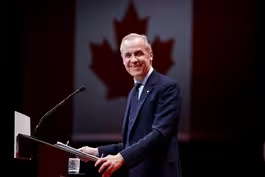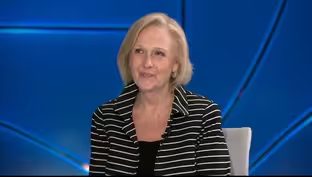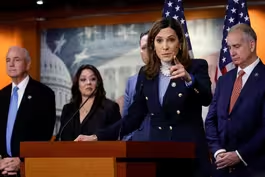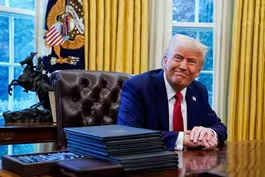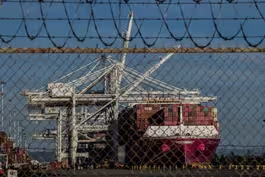
Analyzing Trump's immigration agenda in his first 100 days
Clip: 4/29/2025 | 6m 6sVideo has Closed Captions
Analyzing Trump's actions on immigration during his first 100 days
President Trump ran on closing the border and made promises about mass deportations of millions of immigrants. White House correspondent Laura Barrón-López and David Bier of the Cato Institute discussed the first 100 days of the Trump administration enforcing his immigration policies.
Problems playing video? | Closed Captioning Feedback
Problems playing video? | Closed Captioning Feedback
Major corporate funding for the PBS News Hour is provided by BDO, BNSF, Consumer Cellular, American Cruise Lines, and Raymond James. Funding for the PBS NewsHour Weekend is provided by...

Analyzing Trump's immigration agenda in his first 100 days
Clip: 4/29/2025 | 6m 6sVideo has Closed Captions
President Trump ran on closing the border and made promises about mass deportations of millions of immigrants. White House correspondent Laura Barrón-López and David Bier of the Cato Institute discussed the first 100 days of the Trump administration enforcing his immigration policies.
Problems playing video? | Closed Captioning Feedback
How to Watch PBS News Hour
PBS News Hour is available to stream on pbs.org and the free PBS App, available on iPhone, Apple TV, Android TV, Android smartphones, Amazon Fire TV, Amazon Fire Tablet, Roku, Samsung Smart TV, and Vizio.
Providing Support for PBS.org
Learn Moreabout PBS online sponsorshipGEOFF BENNETT: And for another perspective on President Trump's immigration agenda at its 100-day mark, let's turn to White House correspondent Laura Barron-Lopez -- Laura.
LAURA BARRON-LOPEZ: Thanks, Geoff.
I'm joined by David Bier.
He's the director of immigration studies at the Cato Institute.
David, thank you for joining the "News Hour."
DAVID BIER, Director of Immigration Studies, Cato Institute: Thanks for having me.
LAURA BARRON-LOPEZ: President Trump ran on closing the border and on promises of mass deportation of millions.
And since he's been in office, his administration has run a million-dollar ad campaign pressuring migrants to deport.
He's detained foreign students who protest on campus.
And his administration even arrested a judge on courthouse grounds.
So, 100 days in, what do you think defines President Trump's immigration agenda?
DAVID BIER: His immigration policy is really driven by the overarching goals of this administration, which is to consolidate as much power over the U.S. economy and society as possible.
So, if you look at it, it's not about legal versus illegal.
We're arresting legal residents.
We're arresting people who never violated any immigration law or any other laws.
We're targeting U.S. citizens, taking away citizenship from babies born in the United States.
We're eliminating due process for people charged as removable in the United States.
So, now your birthright -- your birth certificate is no longer going to be a defense for you if you are being targeted by ICE.
And then you're not going to get any due process by this administration either.
They're going to deport you even to a foreign prison without any due process.
And we're already explicitly hearing from the president plans and considerations to target U.S. citizens for removal to El Salvador.
LAURA BARRON-LOPEZ: The White House says they're looking into the legality of that possibility.
One of the successes that the southern -- that the president is touting is that southern border crossings have fallen to lows not seen in decades.
But when asked by the administration why they're keeping the emergency declaration in place at the border, President Trump's border czar, Tom Homan, said this: TOM HOMAN, White House Border Czar: It's an emergency until we shut it down.
It's an emergency until the cartels are wiped off the face of this Earth.
This is the biggest national security failure this country's ever seen.
This is the border emergency until we end it, end all of it.
We're making good strides.
But, right now, it's still an emergency until we shut it down.
LAURA BARRON-LOPEZ: What's your response to Tom Homan's comments?
And is it sustainable for them to keep the crossings that low?
DAVID BIER: Well, I don't think it's sustainable in the long term, but, really, what he's saying there is that it's going to be an emergency forever, because there's always going to be violations of the law.
There's always going to be transnational criminal organizations.
So the idea that we're in a perpetual state of emergency, where the president has permanent emergency powers, really goes to my point about, look, this is about power.
He wants to have these emergency powers going forward to be able to target whoever he wants for deportation and removal without due process.
LAURA BARRON-LOPEZ: Correct me if I'm wrong, but there's some parts of the administration's agenda that you, in theory, support, like that there should be no federal funding to cities that shelter immigrants, right?
DAVID BIER: Absolutely, yes, I don't support Congress' appropriations for that money.
Of course, the president should follow whatever laws Congress passes.
LAURA BARRON-LOPEZ: And so that's the thing.
You disagreed with them deciding to withdraw funding from cities who ended up sheltering immigrants, correct, the administration's withdrawing of those funds.
DAVID BIER: Well, obviously, Congress appropriated this money for this purpose.
You can't just take that money and decide, I'm going to spend it on deportations because that's what I want to spend money on.
That's not how we operate in a democracy.
Congress passed the laws to do this.
I think it's totally inappropriate for Congress to be paying for New York City's shelter program.
But that's not up to me.
Congress decided to appropriate this money.
And it's not up to the president either.
He should follow the laws as they're written.
LAURA BARRON-LOPEZ: On sanctuary cities, President Trump signed an executive order yesterday threatening to withhold federal funds for states and localities that -- quote -- "provide in-state higher education tuition to aliens" -- end quote.
And Tom Homan also promised more raids and arrests of undocumented migrants.
Do you expect an escalation between federal agents and state and local authorities?
DAVID BIER: We're already seeing the escalation with the arrest of a state judge.
This is the trajectory that we have been going on.
They have been threatening criminal penalties for Democratic cities that do not cooperate with the mass deportation agenda of this administration.
And it's understandable why these municipalities lack trust with this administration because they're not targeting criminals and public safety threats.
I think some of these sanctuary policies go too far, but that does not mean that they should be targeted with criminal penalties or other retaliation by the federal government.
LAURA BARRON-LOPEZ: In recent weeks, multiple federal courts have blocked the president's deportations, especially under the Alien Enemies.
A Republican-appointed federal judge said that, if the administration is claiming it has the authority to send migrants to foreign prisons with no due process, then what assurance will there be to Americans that they won't be deported and then the government takes no responsibility for returning them?
A few days after, about a week or so after that ruling, three U.S. citizen children were deported by the administration, along with their undocumented mothers.
And those lawyers for those children told me that they had no ability to talk to legal counsel or to go through due process.
Do you think ultimately that the courts are going to be the check on President Trump's immigration agenda?
DAVID BIER: Well, that really remains to be seen.
We don't know how the Supreme Court is going to decide these cases.
If they are the check, then that is a significant limitation on his power.
But if they decide to green-light these abuses of authority and failure to follow the Constitution, then that would upend our system of government as we know it.
LAURA BARRON-LOPEZ: David Bier of the Cato Institute, thank you for your time.
DAVID BIER: Thanks for having me.
How Mark Carney led Canada's Liberal Party to election win
Video has Closed Captions
Clip: 4/29/2025 | 10m 4s | How Mark Carney led Canada's Liberal Party to an election win (10m 4s)
PBS CEO on the impact of cutting public media funding
Video has Closed Captions
Clip: 4/29/2025 | 8m 29s | PBS CEO weighs in on the potential impact of cutting public media funding (8m 29s)
Salazar pushes citizenship path for undocumented migrants
Video has Closed Captions
Clip: 4/29/2025 | 9m 2s | GOP Rep. Salazar calls for pathway to citizenship for some undocumented immigrants (9m 2s)
Where Trump's approval rating stands after 100 days
Video has Closed Captions
Clip: 4/29/2025 | 5m 45s | Where Trump's approval rating stands after 100 days in office (5m 45s)
Why Trump softened some tariffs on automotive industry
Video has Closed Captions
Clip: 4/29/2025 | 5m 59s | Why Trump softened some of his tariffs on the automotive industry (5m 59s)
Providing Support for PBS.org
Learn Moreabout PBS online sponsorship
- News and Public Affairs

FRONTLINE is investigative journalism that questions, explains and changes our world.

- News and Public Affairs

Amanpour and Company features conversations with leaders and decision makers.












Support for PBS provided by:
Major corporate funding for the PBS News Hour is provided by BDO, BNSF, Consumer Cellular, American Cruise Lines, and Raymond James. Funding for the PBS NewsHour Weekend is provided by...
